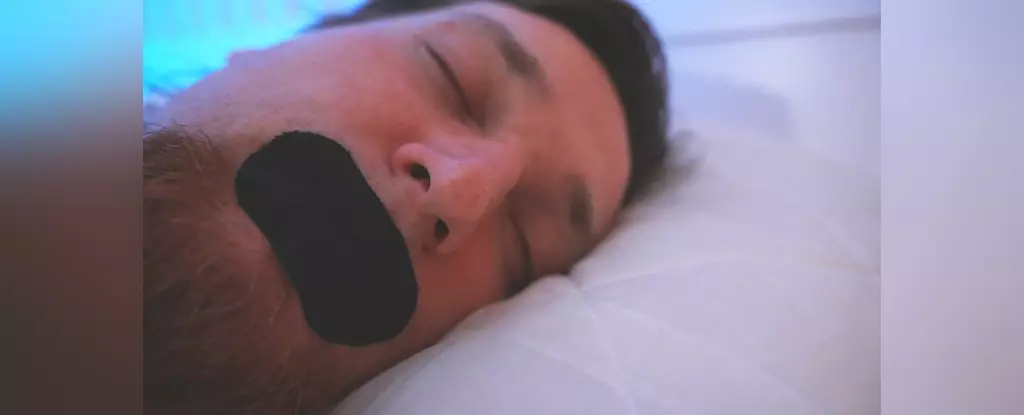In today’s fast-paced world, where everything from beauty routines to health solutions is just a TikTok scroll away, it’s no surprise that mouth taping has emerged as a buzzword for those grappling with sleep disorders. The idea that a low-cost, accessible solution could potentially address issues like snoring or even obstructive sleep apnea has captivated many desperate individuals and their partners. However, beneath this viral phenomenon lies a darker undercurrent: a lack of solid scientific evidence and potential health risks that can’t be ignored.
The notion that taping one’s mouth at night could lead to better sleep or improved jawline definition may sound enticing, especially when touted by influencers with millions of followers. Yet, as appealing as it may seem, one must tread cautiously in a landscape where misinformation often masquerades as fact. Social media may inspire an aura of credibility around such practices, but when it comes to health and well-being, we must rely more on science than on sensationalized anecdotes.
The Science Says: Caution Is Key
A deep dive into the reputable research surrounding mouth taping reveals a critical gap between hype and reality. While a select few studies have suggested potential benefits for those suffering from mild obstructive sleep apnea, the overwhelming consensus points toward an alarming lack of evidence supporting broad claims associated with mouth taping. In fact, many studies involved small sample sizes that lacked adequate controls and follow-up, raising serious questions about their reliability.
What’s essential to underscore is that for individuals with more severe conditions, the risks of mouth taping far outweigh any perceived benefits. If a person is breathing through their mouth due to nasal obstructions—be it from sinus infections, anatomical defects, or other ailments—simply sealing the mouth may lead to dangerous consequences such as asphyxiation. This is a classic case of treating a symptom, not the root cause, and can undermine legitimate pathways to treatment. The allure of a “quick fix” can doodle over crucial medical interventions that could solve the underlying issues.
The Risks of Embracing Fad Solutions
What is particularly concerning about this trend is its potential to mislead individuals into thinking they are working toward better health, all while they might be ignoring more serious medical conditions. The inevitability of delayed treatment is a genuine concern. People may avoid seeking professional advice, convinced that they have found the miracle solution to a complex problem through a piece of tape. This phenomenon highlights a more extensive societal issue that plagues healthcare—the temptation to choose convenience over evidence-based practices.
Moreover, even the reports that find favor with mouth taping certainly do not advocate for it as a standalone remedy. Researchers consistently note that further investigations are needed, especially given the varied outcomes observed even among those most likely to benefit. There is a glaring absence of a clear clinical guideline on when or how mouth taping should be applied, making this practice even more precarious.
The Role of Fake Experts and Social Media in Our Decisions
The problem intensifies as healthcare narratives get twisted in the chaotic whirlpool of social media influence. Are we truly able to discern expert advice from mere endorsements packaged as life hacks? The shift toward trusting social media personalities over medical professionals poses a significant threat to public health. There exists a further risk where platforms like TikTok and Instagram may diminish the perceived gravity of medical issues, reducing them to passing trends rather than urgent health concerns requiring serious consultation.
Embarking on a journey of self-diagnosis and self-treatment guided by scant evidence and appealing visuals may lead to regretful choices in a quest for wellness. In our quest for better sleep and health, we must resist the allure of quick solutions touted by social media and confront the hard truths of our health conditions with the guidance of qualified professionals.
The temptation is understandable in a society constantly pushing for efficiency, but it is essential that we prioritize a thoughtful, informed approach over a desperate dive into the latest online trend. Real health solutions demand more than simple tactics fostered in the marketplace of social media—they require hard science, diligence, and, most importantly, a commitment to seeking out factual medical advice.


Leave a Reply